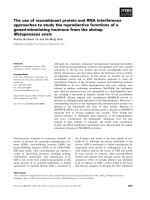To study the work life balance among working women, post maternity in banking sector
Bạn đang xem bản rút gọn của tài liệu. Xem và tải ngay bản đầy đủ của tài liệu tại đây (293.52 KB, 8 trang )
International Journal of Management (IJM)
Volume 11, Issue 2, February 2020, pp. 233–240, Article ID: IJM_11_02_024
Available online at />Journal Impact Factor (2020): 10.1471 (Calculated by GISI) www.jifactor.com
ISSN Print: 0976-6502 and ISSN Online: 0976-6510
© IAEME Publication
Scopus Indexed
TO STUDY THE WORK LIFE BALANCE
AMONG WORKING WOMEN, POST
MATERNITY IN BANKING SECTOR
Mandeep Kaur
Research Scholar, MMIM, Maharishi Markandeshwar Deemed University,
Mullana, Ambala, Haryana, India
Dr. C. Venkateswaran
Associate Professor, MMIM, Maharishi Markandeshwar Deemed University,
Mullana, Ambala, Haryana, India
ABSTRACT
The Objective of this study explains the Service sector contribution to the global
output is more. The service factor itself is the largest part of the economy for the
countries around the world, the worthy reason being urbanization, privatization and
instant demand for final consumer services. Quality services being the ingredient for
welfare of an economy, the primary and secondary sectors are directly dependent on
the progress of services like banking, insurance, trade and commerce together with
entertainment, social and personal aspects specifically in advanced economies.
Service sector shows a complimentary role and accelerates the process of
development through quality improvement and enhancement with efficiency of
productivity and developmental activities. Fabricating services tends to require
relatively more human capital with less natural capital, thereby demand has geared
for more educated workers, stimulating countries to capitalize more in education for
the overall benefit to their people.
Keywords: Working Women, Banking Sector, Quality services.
Cite this Article: Mandeep Kaur and Dr. C. Venkateswaran, To Study the Work life
Balance among Working Women, Post Maternity in Banking Sector, International
Journal of Management (IJM), 11 (2), 2020, pp. 233–240.
/>
1. INTRODUCTION
In the upcoming years, services will continue to control the growth story. For socio economic
development of any country service sector plays a predominant role. The service sector
comprises of versatile activities ranging from sophisticated Information and Communication
technology to the simplest service provided by informal sector workers. National Income and
potentiality of employment are the real contribution which constitutes greater component of
/>
233
To Study the Work life Balance among Working Women, Post Maternity in Banking Sector
service sector. India‟s distinctiveness lies in being the second fastest growing economy in the
world with respect to services (Report of Confederation of Indian Industry and KPMG).
Service sector contribution to the global output is more. The service factor itself is the largest
part of the economy for the countries around the world, the worthy reason being urbanization,
privatization and instant demand for final consumer services. Quality services being the
ingredient for welfare of an economy, the primary and secondary sectors are directly
dependent on the progress of services like banking, insurance, trade and commerce together
with entertainment, social and personal aspects specifically in advanced economies. Service
sector shows a complimentary role and accelerates the process of development through
quality improvement and enhancement with efficiency of productivity and developmental
activities. Fabricating services tends to require relatively more human capital with less natural
capital, thereby demand has geared for more educated workers, stimulating countries to
capitalize more in education for the overall benefit to their people.
2. POST MATERNITY
Post maternity is period of three to six month after delivering a baby. Working women are
liable to get 26 week leave from their job for taking care of her baby. The term post maternity
or immediate postpartum period are commonly used to refer to the first six weeks following
childbirth. The World Health Organization (WHO) describes the postnatal period as the most
critical and yet the most neglected phase in the lives of mothers and babies.
3. PSYCHOLOGICAL CHALLENGES
Working mothers has to fulfil the demand at work followed by various demands at home. In
today‟s scenario the husband and wife both work towards creating a balance with their work
life as well as at home with their children. But it is still difficult for women as she has to play
multiple roles of a mother, childrearing, a cook, a family maid, a tutor, a nurse as well as cater
to the demands of office work. This can leave a working woman stressed and anxious; more
so if the family is not supportive
4. WORK LIFE BALANCE
The world of work has changed from 9 to 5 affairs to a 24 hour, 7 day where customers
expect services at times that suit them. (Chartered Institute of Personnel Development) The
concept of Work Life first came into sight in 1980‟s when the workplace dynamic began to
change the level of satisfactory involvement of the exact fit among flexible roles played by an
individual is Work Life Balance. The Work Life Balance ranks as the second most imperative
factor of workplace attributes beyond compensation as reviled by Corporate Executive Board
which conducted the research
For more than 50,000 global workers. It is basically a positive relationship between Work
& other equally accorded activities in life which comprises of family life too. Concern
towards Work Life Balance is becoming increasingly a fact for employers and employees.
The very issue of Work Life Balance has become increasingly a global phenomenon. The
clearer is the issue related to Work Life Balance more is the understanding and the penetration
of these domains in individuals‟ lives. “The notion of Work Life Balance underwent a drastic
change when the number of women workers and dual earner couples increased in various
important sectors (Voydanoff, 1987, Lambert 1990; Burke & green glass, 1987)”. “Work Life
Balance has been generous consideration and has been a matter of concern for both
employees and employers for many years (Guest 2002)”. In coming years Work and Life
would receive increasing attention and would also facilitate to retain skilled employees as
opined by US Department of Labour (1999). “The negative side of Work family is
/>
234
Mandeep Kaur and Dr. C. Venkateswaran
operationalized as Work-Family conflict and Positive side is operationalized as enrichment or
facilitation” (Frone 2003). Work Life Balance is defined as a contented state of equilibrium
achieved between employee‟s primary priorities of their employment position & their private
life style. Work-family conflict is defined as “a form of role conflict characterized by the
incongruence between responsibilities of the home and workplace which are mutually
incompatible (Greenhaus and Beutell, 1985)”. Work Life Balance is “the extent to which an
individual‟s effectiveness and satisfaction in work and family roles are compatible with the
individual‟s life priorities (Greenhans and Allen, 2006)”. Work–family balance is defined “as
accomplishment of role related expectations that are negotiated and shared between an
individual and his or her rolerelated partners in the work and family domains (Grzywacz and
Carlson, 2007)”. Work Life Balance defined by Kirch meyer (2000) as “achieving satisfying
experiences in all the life domains and to do so requires personal resources such as energy,
time & commitment be well distributed across domains” (p.81). Work Life Balance is defined
as “global assessment that work resources meet family demands and family resources meet
work demands such that participation is effective in both domains” (Voydanoff, 2005, p.825).
Frone (2003) sees such a balance as “a condition where there is minimal conflict and
substantial facilitation between work & family spheres.”
5. WORK LIFE BALANCE WOMEN EMPLOYEES
In Banks Career has now become integral part of women due to several factors such as
promotion of educated women, growing economic force, and an ever burning desire to be
socially and economically independent. The enormous employment opportunities created by
banks help potential women aspirants to seek jobs in banking arena. Women job seekers find
these specific banking jobs more attractive due to their innate traits which submissively suits
banks nature of work. Therewith, the entry of women folk to banking sector due to abundant
employment opportunities helped to occupy positions in all cadres not only in public, private
but also in new generation banks. As is revealed by a survey headed by Prof. Ivanovich,
Department head at the National centre of Public Health protection, Bulgaria on „working
conditions in the banking sector‟, women employees experienced more discomfort compared
to male counterparts in banking sector. The psychological distress physical discomforts such
as headache, eyestrain along with fatigue was observed in Women employees. Although
women employees working in public and private sector banks make themselves qualified with
CAIIB and other officer Cadre exams, they give up promotional opportunities due to fear of
being dislocated from the family. Women executives at the age of thirty find an imbalance in
work life due to the very thought of attending toddlers, attending to the requirements of new
born creates a sense of distraction which may have an impact on the productivity of the
female executives.
Women while performing different roles according to the positions occupies namely
accountant, Forex officer, and Assistant branch manager tend not to leave the banks without
tallying the daily formalities. Hence, the Work Life harmony becomes a dream for women
employees across banks. Besides the women executives may need to move across banks to
attend official meetings or any mode of assignments which keeps them away from their
family. Research confirms that majority of women are working 40-45 hrs per week and most
of them are unable to achieve Work Life Balance. Women employees not only strive to
manage the routine family commitments on one hand but even the day-to-day assigned
official tasks on the other which disrupt Work Life Harmony.
/>
235
To Study the Work life Balance among Working Women, Post Maternity in Banking Sector
6. PERSPECTIVES OF WOMEN TOWARDS BANKING SECTOR
In our hustling lives, we will in general overlook that probably the most significant grown-ups
in our lives were our educators when we were growing up. It very well may be far from being
obviously true whether there is a lady behind an effective man, yet it is unquestionable that
there are some extraordinary instructors behind each fruitful man and lady. In learning one
can educate, and in training you learn. I discover instructing as perhaps the best calling due to
following reasons: It is establishing and lowering calling which offers you a possibility of
ceaselessly showing signs of improvement. It has its high points and low points yet overall it's
satisfying when you help youngsters to leave school with better than average evaluations and
realize they have a future. The children's energies; their curiosity makes rouses showing them
and pushing them harder. What's more, once in a while these Kids are genuine enjoyment. It
extends employment opportunity security. Indeed, even in the midst of monetary battle when
different businesses cut back, instructors will consistently be required. According to my
experience, what I have found in individuals is they need income without work and easy
secure life. In short Government occupations resemble secure life line.
Numerous administration employments convey with them appealing work and occasion
plans. First of all, you'll get all legislature and open occasions off, which probably won't be
the situation if you somehow managed to work in the private area. Working in government
additionally frequently expects you to be a piece of an association, which can have a couple of
disadvantages, in any case encourages you arrange a reasonable pay and takes care of your
interests. Government occupations has most elevated security there is no possibility that they
will free there employments except if they got and demonstrated that they are not qualified for
carrying out that responsibility. Government employments has secure advancements, it is
extremely unlikely that you should be master for getting advancement or some other
aptitudes. In the event that you have finished some pre-dated course of events in a position,
without a doubt you will be advanced on the off chance that you are administration
representative of course individuals we consider you to be large chief. Individuals will run to
and fro to stand out enough to be noticed to ensure their work is finished. In the event that you
are an administration worker there is a planned of getting top of the line proposition to be
engaged too. As being Indian, I see marriage is viewed as amalgamation of two families get
profits by one another. So each other attempt to get best of one another. On the off chance that
you are an administration representative there is no doubt you resemble hot cake.
6.1. Need
In India of the all out 30 percent individuals who are lower than neediness line, 70 percent are
ladies. Ladies' neediness in India is acceptably identified with the nonattendance of monetary
chances and independence, absence of access to financial assets including credit, land
proprietorship and legacy, absence of access to instruction and support administrations and
their negligible support in the basic leadership process. The circumstance of ladies on
monetary front is no better men despite everything appreciate a bigger portion of the cake. In
this manner poverty remains at the base of sexual orientation separation in our man centric
culture and this monetary reliance on the male partner is itself a reason for sex uniqueness.
6.2. Absence of Employment Facilities
Females are not ready to determine the disagreement between new economic and old built-up
jobs. In both provincial and urban India, ladies invest a huge extent of energy in unpaid home
supporting work. Ladies are not ready to react to new chances and move to new occupations
in light of the fact that their versatility will in general be low due to intra-house hold allotment
of duties. Rights and commitments inside a house hold are not disseminated equitably. Male
/>
236
Mandeep Kaur and Dr. C. Venkateswaran
responsibility for and regular division of work decrease impetuses for ladies to attempt new
exercises. What's more youngster bearing has clear ramifications for work power interest by
ladies. Time spent in bearing and rising of youngsters frequently brings about de-Skilling, end
of long haul work contacts. Hence ladies are not having the option to be financially
independent because of joblessness and their monetary reliance on the male partner is itself a
reason for sexual orientation difference.
6.3. Social Customs, Beliefs and Practices
Women are not liberated from social traditions, convictions and practices. The predictable
concept about joint family framework limits ladies' jobs generally to the residential circle,
allotting them to a subordinate status, authority and force contrasted with men. Men are seen
as the significant suppliers and defenders of a family while ladies are seen as assuming just a
steady job, taking care of the hearth. Young men and young ladies are as needs be useless for
various grown-up jobs, status and authority. In Indian culture since early periods, men have
ruled ladies as a gathering and their status has been low in the family and society. The
preference for children and disgrace towards girl is mind boggling wonder that despite
everything endures in numerous spots. Children particularly in the business networks are
viewed as monetary, political and ceremonial resources where as little girls are viewed as
liabilities. Consequently hostile to female social tendency is the primary driver of sex
difference in our general public.
6.4. Social Altitude
In unkindness of the fact that numerous social activists and reformers conveyed their
campaign against all social chances to reestablish respect and poise to ladies, attitudinal
variations despite everything chase our provincial masses. In spite of expressed social
improvement and innovative progression, ladies in our general public despite everything keep
on being sufferers of misuse, superstition, absence of education and social monstrosities. The
social shame that ladies are servants and ought to be kept to the four dividers of the house is
maybe a suitable motivation of sex difference. They ought not to speak loudly in regards to
their fortune for the glory of the family. In male centric culture a great deal of weight age is
given to men.
6.5. Absence of Awareness of Women
The greater parts of the females are uneducated of their fundamental rights and capacities.
They even don't have the understanding about how the financial and political powers
influence them. They acknowledge a wide range of prejudicial practices that continue in our
family and society to a great extent because of their numbness and ignorance. If women get
equivalent open doors like men, they can work in each field like men. Today on the off
chance that she lingers behind a bit, it isn't her deficiency however the issue of conventions
which have stifled them for quite a long time , attributable to this, her own considerations like
additionally stay nearby just familial life and her closest condition likewise doesn't give great
conditions to her commitment in the outside work. So as to change the circumstance
alongside monetary development social advancement is likewise enormously required. Thus
the need of great importance is to viably battle sexual orientation uniqueness as to advance
sex balance by adequately enabling the ladies.
/>
237
To Study the Work life Balance among Working Women, Post Maternity in Banking Sector
7. FACTORS CONTRIBUTING IN INCREASING GENDER
DISCRIMINATION
While there are numerous components that clarify sex differentials in mortality and
horribleness, a key determinant is sex imbalance. Sex imbalances show in various manners,
for example, inconsistent access to assets, force, instruction and oppressive socio-social
practices.
7.1. Home Related Factors
Time required for family unit errands and thinking about the family is one of the most
significant factors in the contention originating from the family circle, particularly in families
with kids. Along these lines, the double pay couples with kids will in general have a more
noteworthy number of contentions between the accomplices and a more significant level of
worry than their partners without youngsters. Starting here of view, the sexual orientation jobs
model expect that the idea of the job requests varies in men and women. This time is spent on
exercises, for example, thinking about kids or relatives or family unit tasks. So despite the fact
that ladies have started to emphatically frame some portion of the work power and to invest
more energy with their kids dealing with them, they neither expect a reduction in their pay as
much as ladies accomplish for work interferences because of family issues nor remain at
home to deal with their youngsters. Most men despite everything keep up full contribution in
their work in light of the fact that their female couple accepts the accountability for caring
their kids. In this way, we can reason that ladies will endure more by the impedance of the
family at work, in light of the fact that their more prominent contribution in the family will
can subtract them time, quality and devotion to their work; notwithstanding, men will endure
more by the obstruction of work in the family. Actually, a high ramifications in the family
circle has been demonstrated connected to a higher family-to-work impedance just in ladies
.Moreover, men don't feel a commitment when they are associated with the home as ladies do,
as they see it more as a leisure activity or a free decision. Likewise, those house errands that
keep the home each day (shopping, cooking, washing dishes, washing garments, and cleaning
the house) are viewed as female; while those thought about male or unbiased assignments
don't include day by day commitment. Some social translation contend that ladies are
progressively engaged with house errands and would prefer not to completely share as a result
of the conviction this is fundamental to their sex character and a wellspring of intensity in the
family, while spouses, whose sexual orientation personality has generally been set apart by
paid work, would not question do less family unit tasks than their wives. As spouses are not
accessible for family unit tasks, wives endure over-burden by family errands and passionate
requests identified with youngsters providing care, which will build still more ladies stress
and family to work impedance.
7.2. Socio-Cultural Factors
Based on previously mentioned proof of position of ladies in Indian history it very well may
be said that the central rule of Hindu social association is a shut structure to safeguard land,
ladies and custom virtue inside it. A bunch of Brahmans (all the more explicitly, the religious
class) has forced different traditions and customs which discusses inclination for a male kid
and prevalence of male in our family and society. The principle strict explanation behind child
inclination is situated in the Hindu belief, progressively pervasive among India‟s higher ranks.
The traditions of youngster marriage and gauna were restricted so as to build the cutoff of
eligible age. This will thusly give them chance to benefit instruction and work which will
contribute in making them free and ladies won't be viewed as a burden. A culture fortifies the
sexual orientation job and way of life of spouse and wives. Today, we watch changes in ladies
/>
238
Mandeep Kaur and Dr. C. Venkateswaran
requests and needs in the public arena which they are expected to understand their lost right,
and accomplish the sex correspondence. The present research has been done to contemplate
socio-social components influencing the sex disparity, and variable, including majority rules
system philosophy, sexual orientation stereotype convictions and sex socialization have been
researched. Woman, as a sex class, implies organic being whose body make-up and traits are
not quite the same as that of a man. As far as a sex classification, a lady is a social being that,
from social and social perspective, is relied upon to carry on in a specific way which makes
them look sub-par compared to men.
7.3. Religious Factors
The status of Indian ladies in the public arena is different around the world. Among numerous
significant characteristics related with the separation of sex imbalance is religion, which itself
must be viewed as a liquid idea with translations and practices 'implanted' and along these
lines shifting as for social and chronicled relations. Conceding the intricacy of the issues,
some strict standards and customs can add to the development of sexual orientation
imbalances and to subordinate the job of ladies in society. Gender inequality1 has a place
among the most predominant types of social disparity and exists everywhere throughout the
world, with various impacts in various areas. These distinctions are fundamentally because of
social heritages, authentic improvement, geographic area, and, to wrap things up, the strict
standards which overcome in the community field.
7.4. Economic Factors
The sexual orientation pay gap is a metric that reveals to us the distinction in pay among
ladies and men. It's a proportion of imbalance and catches an idea that is more extensive than
the idea of comparable compensation for equal work. Contrasts in pay among people catch
contrasts along numerous potential measurements, including specialist instruction, experience
and occupation. At the point when the sexual orientation pay hole is determined by
contrasting every single male laborer with every female specialist – independent of contrasts
along these extra measurements – the outcome is the 'crude' or 'unadjusted' pay gap. Despite
what might be expected, when the hole is determined subsequent to representing hidden
contrasts in training, experience, and so forth. At that point the outcome is the 'balanced' pay
gap. Segregation in contracting practices can exist without pay gap
8. CONCLUSION
This study explains the Service sector contribution to the global output is more. The service
factor itself is the largest part of the economy for the countries around the world, the worthy
reason being urbanization, privatization and instant demand for final consumer services.
Quality services being the ingredient for welfare of an economy, the primary and secondary
sectors are directly dependent on the progress of services like banking, insurance, trade and
commerce together with entertainment, social and personal aspects specifically in advanced
economies. Service sector shows a complimentary role and accelerates the process of
development through quality improvement and enhancement with efficiency of productivity
and developmental activities.
REFERENCES
[1]
V Kandaswamy Sharma, Dr. Beulah Suresh and Dr. S Uma Mageswari, A Conceptual
Analysis on Work Life Balance. Journal of Management, 5(4), 2018, pp. 97–100
[2]
Dr. S. Jayaraman, Dr. J. Suhashini, U. Geetha and E. Manju, A Study on Impact of Job
Related Factors on work Life Balance of Automobile Sector Workers in Dindigul District,
/>
239
To Study the Work life Balance among Working Women, Post Maternity in Banking Sector
International Journal of Mechanical Engineering and Technology, 9(11), 2018, pp. 1732–
1740
[3]
Dr. Ajit Kumar Khareand Anupam Kapoor, A Study on Work Life Balance among
Women Labor in Garment Units of NCR, India. International Journal of Management,
10(1), 2019, pp. 19-25
[4]
Raghavendra H K and Raghunandan M V, Women Engineers and Work Life Balance A
case study of Women working in Manufacturing Industries in Mysuru City, International
Journal of Mechanical Engineering and Technology 9(1), 2018. pp. 752–755
[5]
Dr. A. Irin Sutha, A Study on Work Life Balance of Women Professors Working in
Selected Colleges in Chennai City, International Journal of Management, 10 (4), 2019,
pp. 159–167
/>
240









